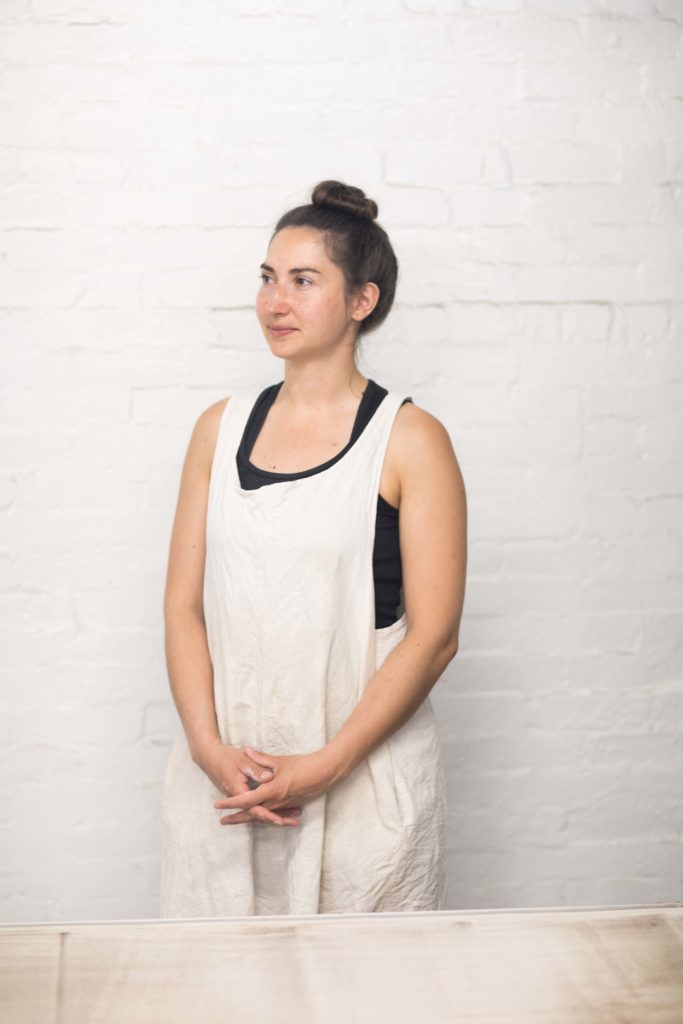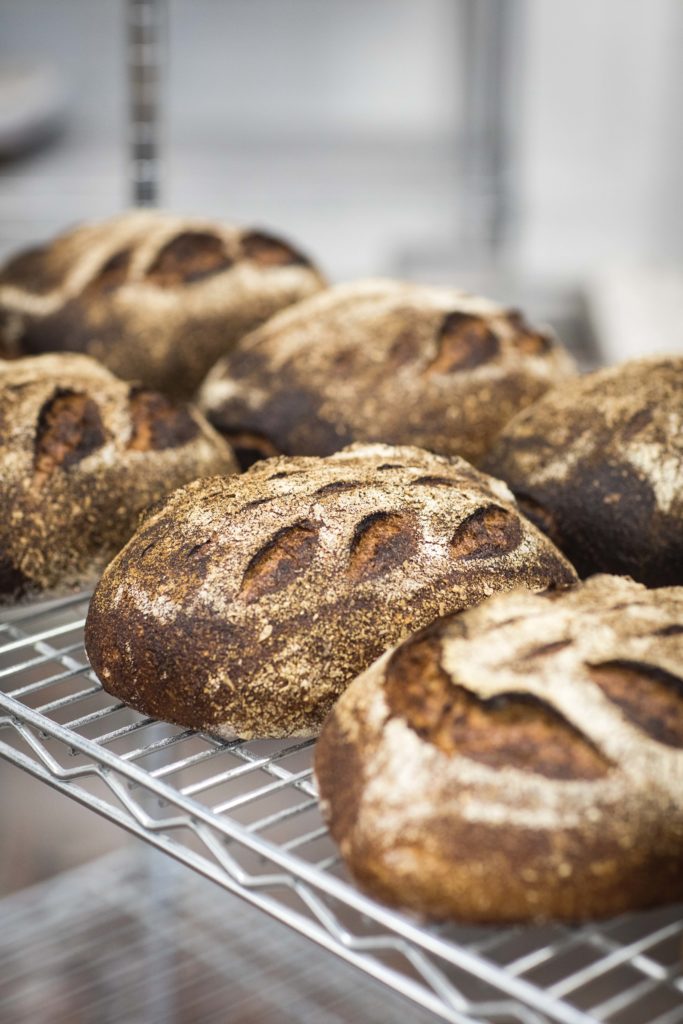Bread for Life
At Night Moves Bakery in Biddeford, Kerry Hanney bakes loaves that nurture body and soul.

Once I find Kerry Hanney’s bakery, Night Moves Bread and Pie, in building 10 of the huge, labyrinth-like Pepperell Mill Campus in Biddeford, I’m content to stay a while. Hanney has just wrapped up one of her twice-weekly bakes and even the tangy yeasty scent in the air feels nurturing. A few of her dark-crusted, tender-crumbed Country Sourdough loaves are spending their last minutes in her Italian deck oven, while a freestanding mill whirrs away grinding grain. All of Hanney’s bread, as far removed from plastic-bagged commercial loaves as a Tiffany solitaire is from a gumball-machine ring, is naturally leavened and made with regionally sourced wheat, rye, and other grains. Much of it comes from Maine Grains in Skowhegan, and Hanney also buys directly from small farmers; it is this grain that is ground between two granite millstones in her New American Stone Mill, built by the owner of Elmore Mountain Bread in Elmore, Vermont. Having started her baking career with pastry, Hanney is now almost entirely devoted to bread (although she does bake pies once a week). Night Moves’s logo—a threaded hand and wrist decorated with phases of the moon, strings extending from the fingers—comes from a recurring dream she had as a child, and that she thinks of now as connective, creative energy, which manifests in the bread.
Q. What’s the story behind the name Night Moves?
A. It was a little bit of a joke at first. I was working one-on-one with a wonderful friend who was obsessed with Bob Seger [whose 1976 ballad “Night Moves” made the singer a star]. That experience was like being on a road trip with someone; all the highs and lows of life all went into the bread. I felt that the name captured how bread has all of these metaphors and life cycles, and just the joy of our experience making it. The name also makes allusions to the mysteries of sourdough and the moon phases playing a role with the life of the sourdough culture. When you start following what the moon phases are and you’re working with the bread, it’s undeniable that certain things tend to happen in line with that. If you come to expect it then you can prepare for it.
Q. What is it about sourdough that appeals to you?
A. It’s just so natural. It’s like gardening or farming; you have to be in tune with your environment and creating the best possible conditions for this natural yeast to thrive. I enjoy the challenge of that and the perceptiveness that it asks of you. There’s also such a wide range of flavor potential, depending on the kind of grain you’re working with— it’s so layered. I started learning about sourdough when I took a three-month baking course at the International Culinary Center in New York City, and later I worked at Scratch Baking Company in South Portland, where I really dug into it. Then I started doing projects at home where I was using all Maine grain and had my sourdough culture that was all fed on Maine grain. Depending on the season, it can keep for a week and stay totally soft inside because it has natural preservatives, which is great for my restaurant customers and for people at home—it’s a big loaf of bread but it really lasts. Most importantly, the bread just feels so much better in your body and nothing tastes like it.
Q. Why is this bread healthier?
A. It’s made with the wild yeast in your environment, so it’s using the culture of your environment to predigest the grain for you. Having those cultures from around us in our gut helps us to process everything better. But no matter where you live, sourdough creates an enzyme that if it’s given enough time can totally process the gluten. So this bread can actually be considered gluten-free because it has such a low parts-per-million of gluten. I have a lot of customers who are not celiac but gluten-intolerant, and they’ve emailed me to say it’s the only bread they can eat.
Q. Why does bread get such a bad rap, health-wise?
A. It’s not bread; it’s everything about the bread. It starts with wheat that was produced for the largest commodity yield but not for the health benefits, and the way that it’s processed removes any remaining health benefits so that it’s more shelf stable. If you take that lifeless flour and you put commercial yeast in it, which is basically filling the bread with sugar and air, then you have this thing that’s shaped like bread, but it’s not actually food for your body.
Q. How has your business evolved?
A. The driving force for me in starting this business was to make these grains more accessible to people in Maine. It’s really healthy food, and I’m excited now that we’re delivering to so many places up the coast, including to the [Maine Grains] mill at Skowhegan. People are becoming more aware that bread can be good for you.

I opened in the mill in the summer of 2018. I started in my apartment in March 2016 and spent two-and-a-half years working overnight, sharing the kitchen at Maple’s in Yarmouth. I’d had this idea of using all local grains and sourdough for a little while, and I could see an opportunity in Portland’s amazing food scene. We also have an unbelievable agricultural community in Maine—the beautiful produce, the animals that are being thoughtfully raised on spent grain from beer, the levels and levels of care. It’s so small here so people really get to know each other; everyone’s equal, and there’s respect for the producer. I didn’t really see anyone taking full advantage of utilizing Maine grains on these thoughtful plates, so I felt like there was a real window there.
We’re now making five times as much bread as we were a year ago. We have 40 wholesale accounts and we’re delivering from Kennebunk up to Belfast twice a week. We do two big bakes a week because of the slow sourdough process. Our mixer holds about 40 kilo-sized loaves of dough at once. We make over 200 country loaves per bake and 100 to 150 of other breads. I want to consider continuing to grow but keeping a cap on the scale. It’s important to me to not have a factory; I want to keep in mind a healthy lifestyle for me and for anyone who works with me, because we’re also putting that energy into the bread.

